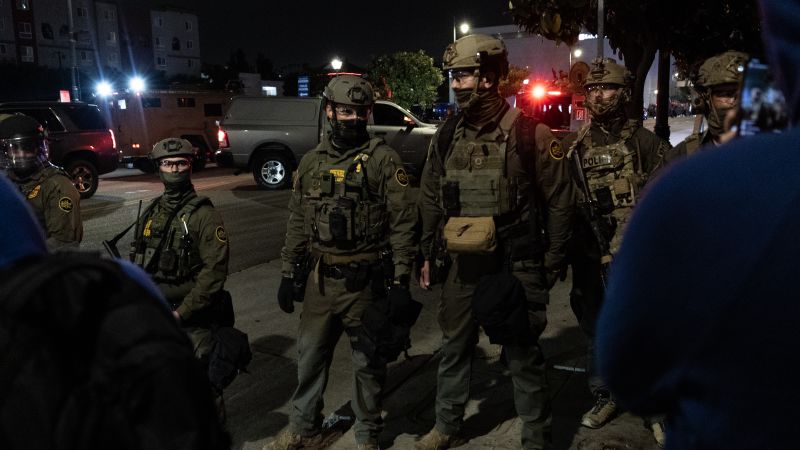Immigrant And Bystander Rights During ICE Enforcement Actions

Welcome to your ultimate source for breaking news, trending updates, and in-depth stories from around the world. Whether it's politics, technology, entertainment, sports, or lifestyle, we bring you real-time updates that keep you informed and ahead of the curve.
Our team works tirelessly to ensure you never miss a moment. From the latest developments in global events to the most talked-about topics on social media, our news platform is designed to deliver accurate and timely information, all in one place.
Stay in the know and join thousands of readers who trust us for reliable, up-to-date content. Explore our expertly curated articles and dive deeper into the stories that matter to you. Visit Best Website now and be part of the conversation. Don't miss out on the headlines that shape our world!
Table of Contents
Immigrant and Bystander Rights During ICE Enforcement Actions: Know Your Rights
The sight of Immigration and Customs Enforcement (ICE) agents can be alarming, sparking fear and uncertainty, especially within immigrant communities. However, understanding your rights—whether you're an immigrant facing potential deportation or a bystander witnessing an ICE operation—is crucial. This article clarifies the rights of both immigrants and bystanders during ICE enforcement actions, empowering individuals to navigate these complex situations effectively.
What are ICE's Powers?
ICE agents have the authority to enforce federal immigration laws. This includes detaining individuals suspected of violating immigration laws, conducting workplace raids, and carrying out targeted enforcement actions. However, their powers are not unlimited, and they are subject to legal constraints. Crucially, they do not have the authority to conduct warrantless searches and seizures in most situations. Understanding this limitation is key to protecting your rights.
Rights of Immigrants During ICE Enforcement Actions:
- Right to Remain Silent: You are not obligated to answer questions from ICE agents without an attorney present. Invoking your right to remain silent is perfectly legal and advisable. Anything you say can and will be used against you in immigration proceedings.
- Right to an Attorney: You have the right to consult with an immigration attorney before speaking to ICE agents. If you cannot afford an attorney, you may be eligible for legal aid. Organizations like the American Immigration Lawyers Association (AILA) can help you find resources. [Link to AILA website]
- Right to Due Process: ICE must follow established legal procedures when detaining and deporting individuals. This includes providing notice of charges, allowing for a hearing, and providing access to legal counsel. Knowing your due process rights is critical in challenging unlawful detention.
- Protection Against Unlawful Searches and Seizures: ICE agents generally need a warrant to enter your home. If they attempt to enter without a warrant, you have the right to refuse entry unless they can demonstrate exigent circumstances (e.g., a crime in progress). Document any such incidents thoroughly.
- Right to Consular Notification: If you are not a U.S. citizen, you have the right to contact your country's consulate or embassy. This is especially important if you are facing deportation.
Rights of Bystanders During ICE Enforcement Actions:
- Right to Remain Silent: Bystanders are not required to answer questions from ICE agents, even if they witness an ICE operation. Remain silent and avoid interfering with the agents' actions unless you are actively assisting someone in danger.
- Right to Record: In most jurisdictions, you have the right to record ICE agents in public spaces. This can be a valuable tool for documenting potential abuses of power. However, be aware of local laws regarding recording law enforcement.
- Right to Refuse Consent to Search: If ICE agents ask for permission to search your property, you have the right to refuse unless they present a valid warrant.
- Right to Seek Legal Counsel: If you believe your rights have been violated as a bystander, consult with an attorney.
What to Do if Your Rights are Violated:
If you believe your rights have been violated during an ICE enforcement action, immediately seek legal counsel. Document the incident as thoroughly as possible, including dates, times, locations, names of agents (if known), and any witnesses. You can also file a complaint with ICE's Office of Professional Responsibility.
Conclusion:
Navigating interactions with ICE can be daunting. However, understanding your rights as an immigrant or bystander is essential to protecting yourself and advocating for justice. Remember, remaining silent, seeking legal advice, and documenting any violations are crucial steps in ensuring your rights are respected. Stay informed, and don't hesitate to seek assistance from legal aid organizations and community groups. Knowing your rights empowers you to act confidently and effectively in challenging circumstances.

Thank you for visiting our website, your trusted source for the latest updates and in-depth coverage on Immigrant And Bystander Rights During ICE Enforcement Actions. We're committed to keeping you informed with timely and accurate information to meet your curiosity and needs.
If you have any questions, suggestions, or feedback, we'd love to hear from you. Your insights are valuable to us and help us improve to serve you better. Feel free to reach out through our contact page.
Don't forget to bookmark our website and check back regularly for the latest headlines and trending topics. See you next time, and thank you for being part of our growing community!
Featured Posts
-
 Bobby Flay Analyzes Carmys Beat Bobby Flay Chances A Chefs Perspective
Aug 25, 2025
Bobby Flay Analyzes Carmys Beat Bobby Flay Chances A Chefs Perspective
Aug 25, 2025 -
 The P Louise Phenomenon How A Loan From Grandma Sparked A Cosmetics Fortune
Aug 25, 2025
The P Louise Phenomenon How A Loan From Grandma Sparked A Cosmetics Fortune
Aug 25, 2025 -
 Economist Paul Krugman Exposes The Heartless Design Of Trumps Immigration Policy
Aug 25, 2025
Economist Paul Krugman Exposes The Heartless Design Of Trumps Immigration Policy
Aug 25, 2025 -
 Youthful Hobbies A Look At The Unexpected Financial Burden
Aug 25, 2025
Youthful Hobbies A Look At The Unexpected Financial Burden
Aug 25, 2025 -
 Vitannya Trampa Ukrayinska Muzhnist Natkhnennya Dlya Svitu
Aug 25, 2025
Vitannya Trampa Ukrayinska Muzhnist Natkhnennya Dlya Svitu
Aug 25, 2025
Latest Posts
-
 Tentative Contract Averted Philadelphia Teacher Strike Details Inside
Aug 25, 2025
Tentative Contract Averted Philadelphia Teacher Strike Details Inside
Aug 25, 2025 -
 Orca Inbreeding Prevention Marinelands Methods Under Scrutiny
Aug 25, 2025
Orca Inbreeding Prevention Marinelands Methods Under Scrutiny
Aug 25, 2025 -
 Is There A Financial Incentive Behind Pediatrician Vaccine Recommendations A Fact Check Of Rfk Jr S Statement
Aug 25, 2025
Is There A Financial Incentive Behind Pediatrician Vaccine Recommendations A Fact Check Of Rfk Jr S Statement
Aug 25, 2025 -
 Head Injury At Whitley Bay Funfair Results In Mans Death
Aug 25, 2025
Head Injury At Whitley Bay Funfair Results In Mans Death
Aug 25, 2025 -
 High Ranking Doj Ethics Official Fired Allegations Against Pam Bondi
Aug 25, 2025
High Ranking Doj Ethics Official Fired Allegations Against Pam Bondi
Aug 25, 2025
